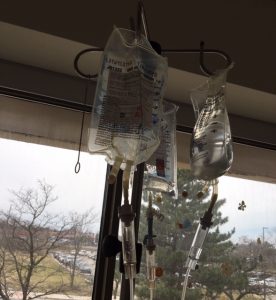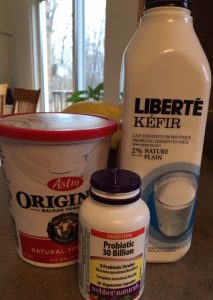In this blog post, I’m going to run down the most common side effects of the drugs I have been given and address each one with a Yes or No for my own experience. The strength of the fasting and keto diet intervention is clear when you see how little I have been affected by side effects…
For each medication, I have pasted a list of side effects from well-respected websites. The Nadir refers to the timing of the lowest point in the cycle, with the most impact on my blood values. When the blood values are too low, chemo can be delayed or dosages might have to be adjusted downwards. Not a good thing…
Chemotherapeutic drugs:
Paclitaxel (taken by IV once every 21 days)
The following side effects are common (occurring in greater than 30%) for patients taking Paclitaxel:
- Low blood counts. Your white and red blood cells and platelets may temporarily decrease. This can put you at increased risk for infection, anemia and/or bleeding. YES, but no infections.
- Hair loss YES
- Arthralgias and myalgias, pain in the joints and muscles. Usually temporary occurring 2 to 3 days after Paclitaxel, and resolve within a few days. NO
- Peripheral neuropathy (numbness and tingling of the hands and feet) NO
- Nausea and vomiting (usually mild) NO
- Diarrhea NO
- Mouth sores NO
- Hypersensitivity reaction. Fever, facial flushing, chills, shortness of breath, or hives after Paclitaxel is given (see allergic reaction). The majority of these reactions occur within the first 10 minutes of an infusion. NO
The following are less common side effects (occurring in 10-29%) for patients receiving Paclitaxel:
- Swelling of the feet or ankles (edema). NO
- Increases in blood tests measuring liver function. These return to normal once treatment is discontinued. (see liver problems). NO
- Low blood pressure (occurring during the first 3 hours of infusion). NO
- Darkening of the skin where previous radiation treatment has been given (radiation recall – see skin reactions). N/A
- Nail changes (discoloration of nail beds – rare) (see skin reactions). NO
Nadir: 15-21 days
Carboplatin (taken through IP port-a-cath directly into my abdominal cavity)
The following side effects are common (occurring in greater than 30%) for patients taking Carboplatin:
- Low blood counts (including red blood cells, white blood cells and platelets) YES
- Nausea and vomiting usually occurring within 24 hours of treatment NO
- Taste changes NO
- Hair loss YES
- Weakness NO
- Blood test abnormalities: Abnormal magnesium level NO
These are less common (occurring in 10-29%) side effects for patients receiving Carboplatin:
- Burning sensation at the injection site NO
- Abdominal pain MINIMAL
- Diarrhea NO
- Constipation YES
- Mouth sores NO
- Infection NO
- Peripheral neuropathy: decreased sensation and paresthesia (numbness and tingling of the extremities) may be noted. Sensory loss, numbness and tingling, and difficulty in walking may last for at least as long as therapy is continued. These side effects may become progressively more severe with continued treatment, and your doctor may decide to decrease your dose. NO
- Central neurotoxicity: Infrequent but patients over age 65 are at increased risk. Symptoms include dizziness, confusion, visual changes, ringing in the ears. NO
- Nephrotoxicity (see kidney problems) NO
- Hearing loss (ototoxicity) – loss of high pitched sounds. NO
- Abnormal blood electrolyte levels (sodium, potassium, calcium). NO
- Abnormal blood liver enzymes (SGOT, Alkaline phosphatase) (see liver problems). NO
- Cardiovascular events. Although infrequent, heart failure, blood clots and strokes have been reported with Carboplatin use. Less than 1% were life-threatening. NO
- Allergic reaction may occur. It would occur during the actual transfusion. NO
Nadir: 21 days
Then there are the medications that they give you to control the side effects of the chemo meds themselves. And they have significant side effects as well…
As I have progressed through the chemo cycles, I have taken progressively less and less of these medications post chemo. Pre-chemo, however, I do not mess with the prescribed levels. They help to prevent reactions to the actual infusion process.
Dexamethasone (a steroid medication)
The following side effects are common (occurring in greater than 30%) for patients taking dexamethasone:
- Increased appetite NO
- Irritability NO
- Difficulty sleeping (insomnia) YES
- Swelling in your ankles and feet (fluid retention) NO
- Heartburn NO
- Muscle weakness NO
- Impaired wound healing NO
- Increased blood sugar levels. YES
Zofran (an anti-nausea medication)
Ondansetron may cause side effects.
- Constipation YES
- Weakness NO
- Tiredness NO
- Chills NO
- Drowsiness NO
- Headache NO
Stemetil( used only on an as needed basis – I might use one dose per cycle)
Prochlorperazine Maleate Tablets is an antipsychotic used to treat schizophrenia, and is also an antiemetic used to control severe nausea and vomiting. Common side effects of prochlorperazine maleate include:
- drowsiness, YES
- dizziness NO
- missed menstrual periods, N/A
- blurred vision, NO
- skin reactions, NO
- low blood pressure, NO
- yellowing of the skin or eyes (jaundice), NO
- agitation, NO
- jitteriness, NO
- insomnia, NO
- neck muscle spasm, and NO
- involuntary repetitive movements (tardive dyskinesia). NO
The ketogenic diet and the fasting protocol have allowed me to thrive through 5 cycles (so far) of these very toxic and powerful drugs with very little impact on my healthy cells, hence very little in the way of side effects. Although I’m bald and I have a period of low lab values each cycle, I also have only 2-4 significantly low energy days per cycle, leaving me with at least 16-18 days every 3 weeks that feel pretty normal. I have been blessed to have not even a sniffle of any infection or illness in the past 3 months, despite a fairly impressive flu and respiratory outbreak season. An amazing feat, in my opinion…



